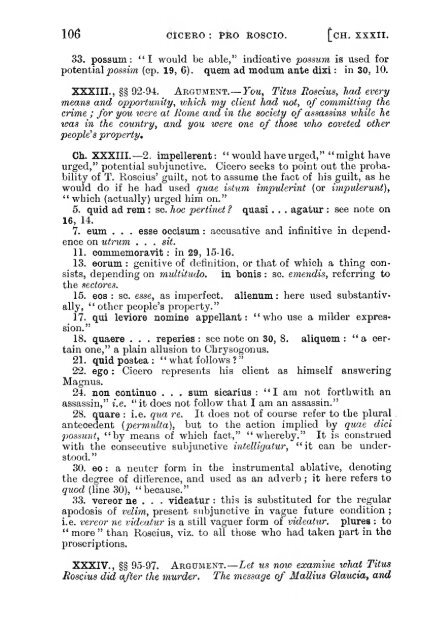Pro S. Roscio Amerino
Pro S. Roscio Amerino
Pro S. Roscio Amerino
Create successful ePaper yourself
Turn your PDF publications into a flip-book with our unique Google optimized e-Paper software.
106 CtCERO : t>iRO tlOSClO. [CH. XXXII.<br />
33. possum: "I would be able," indicative possum is used for<br />
potential possim (cp. 19, 6) . quem ad modum ante dixi : in 30, 10.<br />
XXXIII., §§ 92-94. Abgument.— You, Titus Roscius, had every<br />
means and opportunity, which my client had not, of committing the<br />
crime ; for you were at Rome and in the society of assassins while he<br />
was in the country, and you were one of those luho coveted other<br />
peopWs property,<br />
Ch. XXXIII. —2. impellerent: " woiild haveurged," "might have<br />
urged," potential subjunctive. Cicero seeks to point out the probability<br />
of T. Roscius' guilt, not to assume the fact of his guilt, as he<br />
would do if he had used quae istum impulerint (or impiderunt),<br />
" which (actually) urged him on."<br />
5. quid ad rem : sc. hoc pertinet ? quasi . . . agatur : see note on<br />
16, 14.<br />
7. eum . . . esse occisum : accusative and infinitive in dependence<br />
on utmm . . . sit.<br />
11. commemoravit : in 29, 15-16.<br />
13. eorum : genitive of definition, or that of which a thing consists,<br />
depending on multitudo. in bonis : sc. emendis, referring to<br />
the sectores.<br />
15. eos : sc. esse, as imperfect. alienum : here used substantivally,<br />
" other people's property."<br />
17. qui leviore nomine appellant " : who use a railder expression."<br />
18. quaere . . . reperies : see note on 30, 8. aliquem " : a certain<br />
one," a plain allusion to Chrysogonus.<br />
21. quid postea " : wliat follows ?<br />
22. ego : Cicero represents his client as himself answering<br />
Magnus.<br />
24. non continuo . . . sum sicarius : "I am not forthwith an<br />
assassin," i.e. " it does not follow that I am an assassin."<br />
28. quare : i.e. qua re. It does not of course refer to tlie plural<br />
antecedent (permidta), but to the action implied by qitae dici<br />
possunt, "by means of which fact," " whereby." It is construed<br />
with the consecutive subjunctive intelligatur, " it can be understood."<br />
30. eo : a neuter form in the instrumental ablative, denoting<br />
the degree of differenee, and used as an adverb ; it here refers to<br />
quod (line 30), "because."<br />
33. vereor ne . . . videatur : this is substituted for the regular<br />
apodosis of velim, present snbjunctive in vague future condition ;<br />
i.e. vereor ne videatur is a still vaguer form of videatur. plures : to<br />
" more " than Roscius, viz. to all those who had taken part in the<br />
proscriptions.<br />
XXXIV., §§ 95-97. Akgument.—Le< us now examine what Titus<br />
Bosciua did after the murder. The message o/ Mallius Olaucia, and<br />
"

















